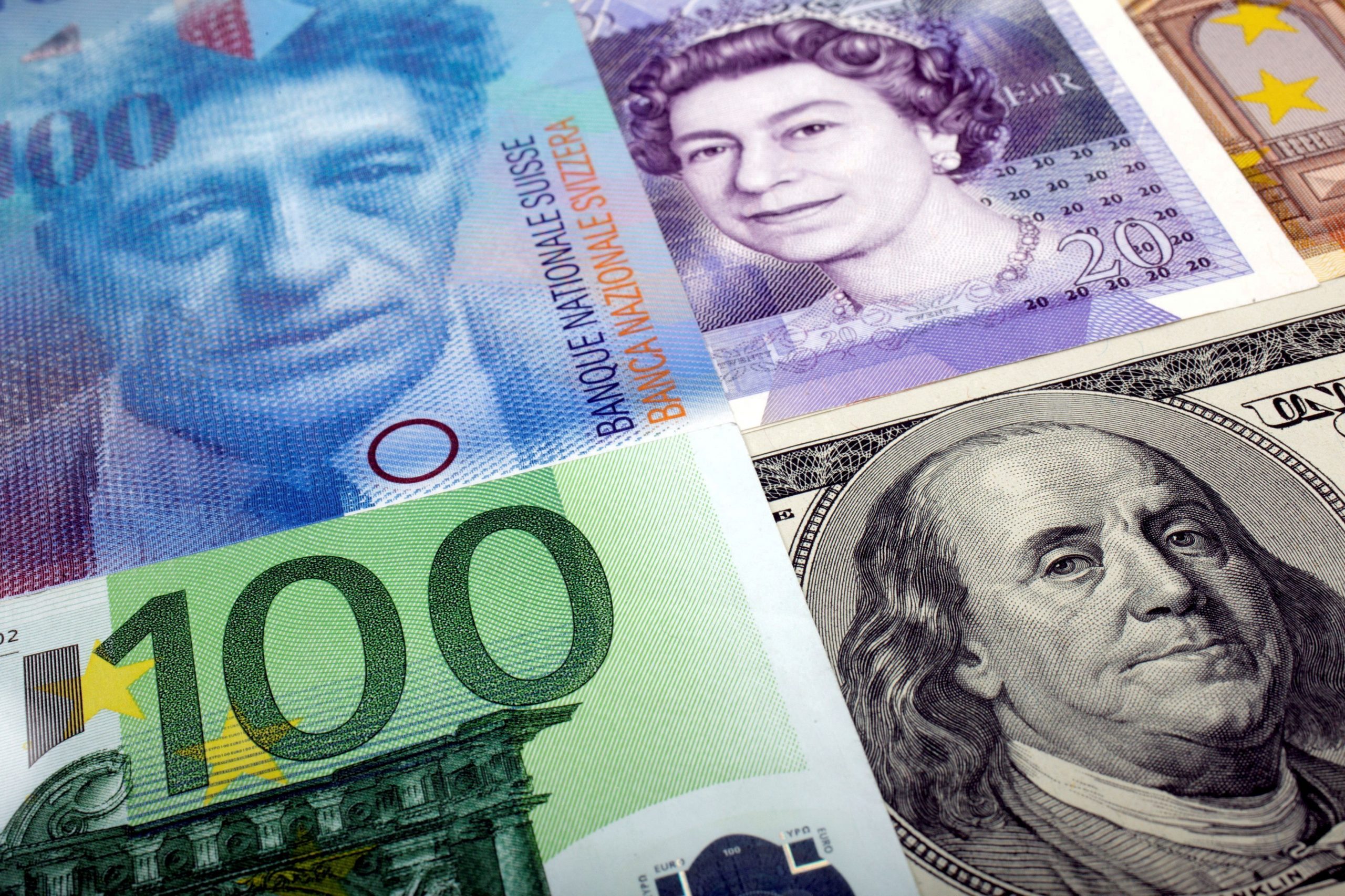Economy
Currency markets nervously eye Ukraine headlines, take heart from possible summit

|
|
Currency markets started the week nervously eying tensions in eastern Europe, with the safe-haven yen not far from a two-week high while the euro was on edge given the energy security and economic implications for Europe of a war in Ukraine.
“Russia-Ukraine tensions are starting to dominate risk sentiment and price action. The market is likely to keep chasing headlines without any clarity on the eventual outcome,” said analysts at Barclays in a note.
Illustrating this, the euro took a small lift early in the Asian session after the office of French President Emmanuel Macron said U.S. President Joe Biden and Russian President Vladimir Putin have agreed in principle to hold a summit on the Ukraine crisis, though it added such a meeting would be impossible if Russia invaded Ukraine.
In turn, the yen lost a modicum of ground on the dollar following the announcement, which comes after a week of heightened tensions spurred by Russia’s military build-up on Ukraine’s borders.
The euro was 0.12% higher at $1.13340 while the yen was at 115.05 per dollar, pausing its earlier drift towards its two-week low of 114.78 touched Friday.
Safe havens like the yen and Swiss franc have been the major beneficiaries of the geopolitical tension in eastern Europe.
Earlier in the session the euro had been hurt and the yen boosted by Sunday’s announcement from the Belarusian defence ministry that Russia would extend military drills in Belarus.
In broad terms, moves in currencies aligned with moves in risk sentiment across asset classes. U.S. share futures slipped in early trading on Monday, before turning positive after news of the possible summit. [MKTS/GLOB]
When not thinking about the situation in eastern Europe, currency markets are also still concentrating on central bank policy, with divergences in the speed and size of different markets’ interest rate hikes a major factor.
As a result, markets will be closely watching a string of public remarks from U.S. Federal Reserve policy makers this week for any hint that a large 50 basis point rate hike could come at the Fed’s March meeting instead of the more widely expected 25 basis point increase.
The pound was drifting somewhat at $1.36000 in the middle of its recent range, given some support by expectations of another rate hike at the Bank of England’s March meeting, though perhaps weighed by Ukraine tensions.
Public remarks are also due from several BOE policy makers as well.
Bitcoin recovered a little from a mild bruising over the weekend. The world’s largest cryptocurrency was up 2% at around $39,000.
Early on Monday it touched a new two-week low of $38,210.
(Reporting by Alun John; Editing by Stephen Coates)
Economy
Biden's Hot Economy Stokes Currency Fears for the Rest of World – Bloomberg


As Joe Biden this week hailed America’s booming economy as the strongest in the world during a reelection campaign tour of battleground-state Pennsylvania, global finance chiefs convening in Washington had a different message: cool it.
The push-back from central bank governors and finance ministers gathering for the International Monetary Fund-World Bank spring meetings highlight how the sting from a surging US economy — manifested through high interest rates and a strong dollar — is ricocheting around the world by forcing other currencies lower and complicating plans to bring down borrowing costs.
Economy
Opinion: Higher capital gains taxes won't work as claimed, but will harm the economy – The Globe and Mail
Canada’s Prime Minister Justin Trudeau and Finance Minister Chrystia Freeland hold the 2024-25 budget, on Parliament Hill in Ottawa, on April 16.Patrick Doyle/Reuters
Alex Whalen and Jake Fuss are analysts at the Fraser Institute.
Amid a federal budget riddled with red ink and tax hikes, the Trudeau government has increased capital gains taxes. The move will be disastrous for Canada’s growth prospects and its already-lagging investment climate, and to make matters worse, research suggests it won’t work as planned.
Currently, individuals and businesses who sell a capital asset in Canada incur capital gains taxes at a 50-per-cent inclusion rate, which means that 50 per cent of the gain in the asset’s value is subject to taxation at the individual or business’s marginal tax rate. The Trudeau government is raising this inclusion rate to 66.6 per cent for all businesses, trusts and individuals with capital gains over $250,000.
The problems with hiking capital gains taxes are numerous.
First, capital gains are taxed on a “realization” basis, which means the investor does not incur capital gains taxes until the asset is sold. According to empirical evidence, this creates a “lock-in” effect where investors have an incentive to keep their capital invested in a particular asset when they might otherwise sell.
For example, investors may delay selling capital assets because they anticipate a change in government and a reversal back to the previous inclusion rate. This means the Trudeau government is likely overestimating the potential revenue gains from its capital gains tax hike, given that individual investors will adjust the timing of their asset sales in response to the tax hike.
Second, the lock-in effect creates a drag on economic growth as it incentivizes investors to hold off selling their assets when they otherwise might, preventing capital from being deployed to its most productive use and therefore reducing growth.
Budget’s capital gains tax changes divide the small business community
And Canada’s growth prospects and investment climate have both been in decline. Canada currently faces the lowest growth prospects among all OECD countries in terms of GDP per person. Further, between 2014 and 2021, business investment (adjusted for inflation) in Canada declined by $43.7-billion. Hiking taxes on capital will make both pressing issues worse.
Contrary to the government’s framing – that this move only affects the wealthy – lagging business investment and slow growth affect all Canadians through lower incomes and living standards. Capital taxes are among the most economically damaging forms of taxation precisely because they reduce the incentive to innovate and invest. And while taxes on capital gains do raise revenue, the economic costs exceed the amount of tax collected.
Previous governments in Canada understood these facts. In the 2000 federal budget, then-finance minister Paul Martin said a “key factor contributing to the difficulty of raising capital by new startups is the fact that individuals who sell existing investments and reinvest in others must pay tax on any realized capital gains,” an explicit acknowledgment of the lock-in effect and costs of capital gains taxes. Further, that Liberal government reduced the capital gains inclusion rate, acknowledging the importance of a strong investment climate.
At a time when Canada badly needs to improve the incentives to invest, the Trudeau government’s 2024 budget has introduced a damaging tax hike. In delivering the budget, Finance Minister Chrystia Freeland said “Canada, a growing country, needs to make investments in our country and in Canadians right now.” Individuals and businesses across the country likely agree on the importance of investment. Hiking capital gains taxes will achieve the exact opposite effect.
Economy
Nigeria's Economy, Once Africa's Biggest, Slips to Fourth Place – Bloomberg


Nigeria’s economy, which ranked as Africa’s largest in 2022, is set to slip to fourth place this year and Egypt, which held the top position in 2023, is projected to fall to second behind South Africa after a series of currency devaluations, International Monetary Fund forecasts show.
The IMF’s World Economic Outlook estimates Nigeria’s gross domestic product at $253 billion based on current prices this year, lagging energy-rich Algeria at $267 billion, Egypt at $348 billion and South Africa at $373 billion.
-
Media10 hours ago
DJT Stock Rises. Trump Media CEO Alleges Potential Market Manipulation. – Barron's
-
Media12 hours ago
Trump Media alerts Nasdaq to potential market manipulation from 'naked' short selling of DJT stock – CNBC
-
Investment10 hours ago
Private equity gears up for potential National Football League investments – Financial Times
-
Media24 hours ago
DJT Stock Jumps. The Truth Social Owner Is Showing Stockholders How to Block Short Sellers. – Barron's
-
Business24 hours ago
Tofino, Pemberton among communities opting in to B.C.'s new short-term rental restrictions – Vancouver Sun
-
Business23 hours ago
A sunken boat dream has left a bad taste in this Tim Hortons customer's mouth – CBC.ca
-
News22 hours ago
Best in Canada: Jets Beat Canucks to Finish Season as Top Canadian Club – The Hockey News
-



 Health23 hours ago
Health23 hours agoCancer Awareness Month – Métis Nation of Alberta










